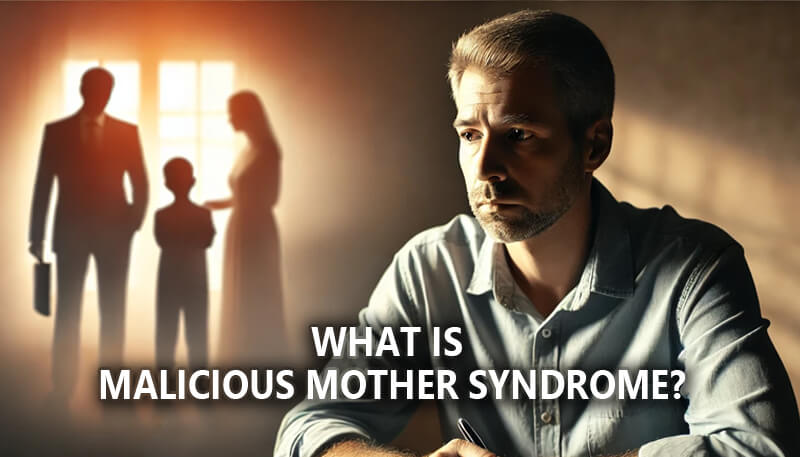Fighting for Fatherhood: Overcoming Malicious Mother Syndrome in High-Conflict Divorces
Divorce is never easy, but when it becomes a high-conflict situation, especially involving children, it can feel like you’re trapped in a nightmare. For many fathers, the fight for their children’s well-being turns into a battle against a force they never expected: Malicious Mother Syndrome. This heartbreaking behavior often leaves fathers feeling helpless and alienated, unsure of how to protect their rights and, more importantly, their relationship with their children.

What Is Malicious Mother Syndrome in High-Conflict Divorces?
Malicious Mother Syndrome occurs when one parent, often the mother, intentionally tries to damage the relationship between the children and their father. It’s not just about winning custody; it’s about using the children as pawns in a cruel game of control. This syndrome, closely related to parental alienation and demonizing parent syndrome, typically involves false allegations, manipulation, and other malicious tactics designed to undermine the father’s role in his children’s lives.
Signs of Malicious Mother Syndrome
If you’re a father going through a high-conflict divorce, you might notice several troubling signs:
- False accusations of abuse or neglect
- Manipulating the children to reject you
- Blocking communication or visitation
- Undermining your authority or role as a parent
These behaviors not only hurt you but can have long-term emotional and psychological consequences for your children. The psychological trauma in children from being forced to choose sides or hearing negative things about a parent can leave lasting scars.
Common Signs in Detail
Behavior |
Description |
|---|---|
False Allegations |
Accusing the father of abuse, neglect, or misconduct without evidence. |
Manipulation of Children |
Encouraging children to disrespect or fear their father without cause. |
Blocking Contact |
Preventing phone calls, visits, or any form of communication between father and children. |
Badmouthing the Father |
Speaking negatively about the father in front of the children influences their perception of him. |
Why Do Some Mothers Engage in Malicious Behavior During Custody Battles?
High-conflict divorces can bring out the worst in people. Sometimes, a mother may resort to malicious tactics due to unresolved anger, a desire for control, or an irrational belief that the children are “better off” without their father. Malicious behavior in custody battles often stems from a deep emotional need to “win” at any cost, even if it means causing harm to the children’s relationship with their father.
Parental Alienation vs. Malicious Mother Syndrome: What’s the Difference?
While parental alienation involves a parent deliberately turning a child against the other parent, malicious mother syndrome goes even further. It’s not just about creating distance between father and child but also involves actively making false claims and damaging the father’s reputation.
Parental Alienation |
Malicious Mother Syndrome |
|---|---|
Turning the child against the parent |
Turning the child and others against the father with malice |
Passive actions, such as discouraging positive feelings toward the father |
Active, hostile actions like false accusations and manipulation |
Primarily impacts parent-child relationship |
Impacts parent-child relationship and father’s legal standing |
How Does Malicious Mother Syndrome Impact Children in Custody Battles?
The emotional strain on children caught in these battles is immense. False allegations in divorce create confusion and instability for kids, making them question the love and support of one of their parents. They may feel guilty for wanting to spend time with their father or become emotionally distant due to fear or manipulation. The long-term effects of malicious mother syndrome can damage the parent-child relationship well into adulthood, creating trust issues and emotional scars that are difficult to heal.

Psychological and Emotional Impact on Children
- Confusion: Children are torn between parents and unsure who to believe.
- Guilt: They may feel guilty for loving or wanting to spend time with the targeted parent.
- Trust issues: Children may develop difficulty trusting people, including their parents, over time.
What Legal Options Do Fathers Have Against False Accusations?
Many fathers wonder, “Can you sue for malicious parent syndrome?” The answer is yes, but the legal challenges in high-conflict divorces can be complex. Proving malicious intent in court requires solid documentation and often the support of expert witnesses who can testify to the psychological damage caused by the other parent’s behavior.
To protect yourself and your children, document malicious behavior from the beginning. Courts take these cases seriously, but you need the right evidence to demonstrate the malicious behavior. Texas law offers several protections for fathers in these situations:
Relevant Texas Statutes
- Texas Family Code § 153.001: Emphasizes the importance of the best interest of the child in custody decisions.
- Texas Penal Code § 37.08: Criminal penalties for false accusations, including filing false reports with intent to deceive.
- Texas Family Code § 153.002 acknowledges parents’ rights to maintain a meaningful relationship with their child, which can be a basis for legal action in cases of alienation or malicious behavior.
Steps Fathers Can Take:
- Consult a Texas Lawyer for Malicious Mother Syndrome: Legal guidance is essential to navigate these complex issues.
- Keep Detailed Records: Document every interaction with your ex-spouse, especially concerning communication and false allegations.
- Seek Therapy for Your Children: A professional therapist can testify to the emotional trauma inflicted by the malicious behavior.
- Work with a Guardian Ad Litem: Request the court appoint a neutral third party to investigate the claims and represent the child’s best interests.
How to Deal with Malicious Mother Syndrome: Strategies for Fathers
If you’re facing malicious mother syndrome, know that you’re not alone. Many fathers have successfully fought back and protected their relationship with their children. Here are a few steps you can take:
- Consult with a Texas lawyer for malicious mother syndrome: Getting professional legal advice is key. A lawyer experienced in family courts and malicious mother syndrome can help you understand your rights and craft a strategy.
- Gather evidence: As mentioned, documenting everything is crucial. Courts rely on hard facts, so keep a detailed record of interactions and any malicious actions.
- Stay connected with your children: It may be tough, but try to maintain as much contact as possible. Let your children know you’re there for them even if communication is restricted.
- Take care of yourself emotionally: Coping with malicious mother syndrome can take a toll on your mental health. Seek support from a therapist, support groups, or trusted friends and family.
Does Family Court Address Malicious Behavior and False Allegations?
Yes, family courts do address malicious behavior and false allegations, but it can be a slow and challenging process. Fathers’ rights in high-conflict divorce cases are taken seriously, especially when it comes to the welfare of the children. Courts are increasingly aware of the damage caused by parental alienation and malicious behavior, but fathers must take proactive steps to protect their rights.

Rebuilding Trust After Divorce: Healing the Parent-Child Relationship
Once the court process is over, and if you’re fortunate enough to regain custody or visitation rights, the real work begins: rebuilding trust after divorce. Alienation and emotional strain in high-conflict divorces can deeply affect your children, but with patience and love, it is possible to mend those relationships. It may take time, but showing consistency, understanding, and unconditional love will go a long way in restoring what was lost.
FAQ on Malicious Mother Syndrome
Can a father file for a restraining order if false accusations are being made during a divorce?
Yes, a father can file for a restraining order if false accusations seriously affect him. This legal step can help protect him from further harassment and ensure that the accusations don’t negatively impact his legal rights or personal safety.
What resources are available for fathers dealing with emotional strain during a high-conflict divorce?
Fathers can find support through:
- Counseling Services: Professional therapy can help manage stress and emotional turmoil.
- Support Groups: Groups specifically for dads dealing with divorce can provide understanding and advice.
- Online Communities: Forums and social media groups offer a space to share experiences and get support from others in similar situations.
How can a father prove that malicious mother syndrome impacts his children’s well-being?
To prove the impact:
- Get Professional Reports: Psychologists or therapists can document how the behavior affects the children.
- Collect School Records: Show any noticeable changes in the children’s grades or behavior as reported by their school.
- Document Behavioral Changes: Keep track of any significant shifts in the children’s behavior or emotional state.
What are the legal consequences for a parent guilty of false allegations in Texas?
In Texas, if a parent is caught making false allegations:
- Contempt of Court: They may face penalties for disrupting court proceedings.
- Criminal Charges: In severe cases, they could face criminal charges.
- Civil Penalties: The wronged parent might also seek damages for the harm caused by the false claims.
Can a father modify a custody arrangement after proving malicious behavior?
Yes, if a father can prove that malicious behavior harms the children, he can request a modification of the custody arrangement. The court will review the evidence and may adjust the custody order to safeguard the children’s well-being better.
What rights do grandparents have in high-conflict divorces involving malicious mother syndrome?
Grandparents might:
- Request Visitation Rights: They can petition for visitation if it’s in the children’s best interest.
- Support: Offer emotional and practical help to the father and the grandchildren, which can be crucial during a high-conflict situation.
How do courts evaluate the psychological impact of malicious behavior on children in custody cases?
Courts assess the impact by:
- Reviewing Psychological Evaluations: Experts provide insights into how the behavior affects the children’s mental health.
- Considering Expert Testimony: Child psychologists or therapists might testify about the effects of the behavior.
- Looking at Behavioral Evidence: Observations of changes in the children’s behavior and school performance are also considered.
Can fathers request mediation instead of going through lengthy court battles in high-conflict divorces?
Yes, fathers can opt for mediation. It’s a more collaborative approach where a neutral mediator helps both parties settle. This can often be faster and less stressful than a full-court battle.
Protect Your Rights and Your Relationship with Your Children
Fathers, you don’t have to face this battle alone. The Longworth Law Firm has extensive experience in handling malicious mother syndrome and other high-conflict divorce cases. We understand the emotional toll this takes on you and your children. Our dedicated legal team is here to help you fight for your rights, protect your relationship with your children, and navigate the complex legal challenges ahead.
If you’re dealing with malicious behavior in custody battles or need to sue for malicious parent syndrome, call Longworth Law Firm today.. We are here to support you every step of the way.
